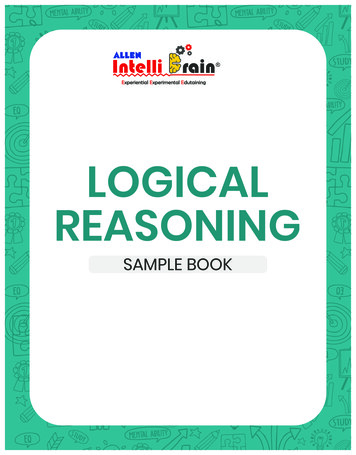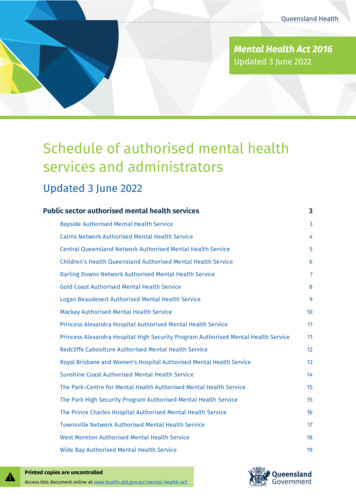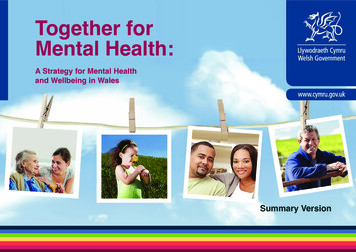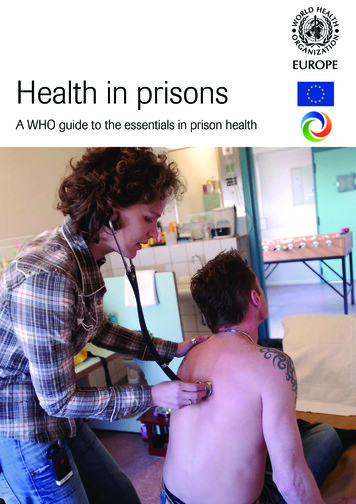
Transcription
tips for goodmental healthPart of the Plainer Language Serieswww.heretohelp.bc.ca
tips for good mental healthtips for good mental healthYou have probably heard about different waysto take care of your body. Did you know thatyou can take care of your mind, too?Mental health is the way we think and feelabout ourselves and the world around us.When we practice good mental health, it iseasier to handle stress and other problems.In this sheet, you will learn different ways tobuild good mental health. You will learn howto:1.2.3.4.5.2Take care of your bodyPractice healthy thinkingSlow downHave funReach outprimer fact sheets
tips for good mental healthtips for good mental health1. Take care of your bodyOur bodies and our minds are connected.When you take care of your body, you alsotake care of your mind.Eat wellFood is our fuel. It gives us importantnutrients that help our bodies work. It makessense that the better we eat, the better wework. Our brains work better, too. Researchshows that the food we eat is a big part ofmental health. Healthy foods like fruits,vegetables and whole grains give us thenutrients to work our best.www.heretohelp.bc.ca3
tips for good mental healthtips for good mental healthHere are some tips on taking care of yourbody: Eat regularly, so your body has enoughfuel to work well all day. Skipping mealscan make you feel tired or irritable. Watch out for too much caffeine. Caffeineis the part of coffee and black tea that givesyou energy. It is in other drinks and snacks,too. Caffeine can add to feelings of anxiety.It can also stop you from sleeping well. Watch how much sugar you eat. Eatingsugar gives you a quick burst of energy.But when that energy is gone, you feelmore tired. It can lower your mood andmake you feel irritable. Watch your alcohol use. Alcohol justhides problems for a short time. It makessadness, stress and other feelings harder todeal with later on.4primer fact sheets
tips for good mental healthtips for good mental healthTo learn more about eating well, talk to adietician. Dieticians have special training tohelp people eat well. In BC, you can talk toa dietician for free. Call 8-1-1 or visit www.healthlinkbc.ca/dietitian to learn more.ExerciseExercise is good for your body. But did youknow that it is also good for mental health?Here are a few ways exercise can help: It helps us cope with stress.It lowers anxiety.It lifts our mood.It boosts our energy.It helps us feel good about ourselvesIt helps us sleep well.www.heretohelp.bc.ca5
tips for good mental healthYou do not have to spend a lot of time forthese effects, either. Just 30 minutes a day,three or four days a week is enough to seebig changes. It does not matter what kind ofactivity you do.Here are some tips for boosting the mentalhealth effects of exercise: Pick something you enjoy. Remember, youcan do any activity that gets you moving! Ifyou like the activity, you are more likely todo it. Focus on how the activity makes you feel. Exercise with someone else. You will getthe benefits of exercise, plus you willconnect with someone else. This is alsogood for your mental health. You are alsomore likely to keep up with your exercisesessions if you plan them with someoneelse. The next time you feel sad, worried orstressed, try going for a walk outside.Walking is a fast and easy way to feel betterabout things in your life.!6If you have a health problem, talk to yourdoctor before you start a new exerciseprogram.primer fact sheets
tips for good mental healthGet enough sleepSleep has a huge effect on mental health.When we get enough sleep, it is easier to copewith stress, handle problems, concentrate,think positively and remember things.The exact amount of sleep you need is basedon your own body. You know that you aregetting enough sleep when you do not feelsleepy during the day.It is easy to think that we can get more doneif we cut back on sleep. But it is harder to getthings done when we do not get enough sleep.Here are some things to try if you do not sleepwell: Avoid exercising too close to your bedtime.Exercise gives you energy. But slow,relaxing activities like yoga can help calmyou down before bed. Avoid big meals, alcohol, cigarettes andcaffeine before bed. Caffeine is the partof coffee or black tea that makes you feelawake.www.heretohelp.bc.ca7
tips for good mental healthtips for good mental health Make sure your room is comfortable forsleeping. Many people find that they sleepbest when their room is dark, quiet andcool. Stick to quiet activities just before bed, likereading. Follow a routine. Try to go to bed aroundthe same time every night and wake uparound the same time every morning, evenon weekends. Only use your bedroom for sleeping andsex. Do work or watch TV in a differentroom. Avoid naps during the day if you have ahard time sleeping at night. Avoid sleeping pills. You may fall asleepfaster, but they do not give you good,restful sleep.Most people have sleep problems from timeto time. If you often have sleep problems, it isbest to talk to your doctor.8primer fact sheets
tips for good mental healthtips for good mental health2. Practice healthy thinkingGood mental health does not meanthat we only ever have happythoughts. Sad or upsetting things arepart of life. Problems are also partof life. Good mental health meanslooking at the situation for what it really is.Watch for thinking trapsThe way we think about something has a bigeffect on the way we feel. If we feel like we canhandle a problem, we often feel good. If we donot think that we can handle a problem, weoften feel bad.Sometimes, we think that something is bad,even when it is not true. These thoughts aresometimes called “thinking traps.” They aretraps because they are easy to fall into and canget us stuck and feeling bad.www.heretohelp.bc.ca9
tips for good mental healthtips for good mental healthHere are some common thinking traps: Thinking that bad things always happen toyou. “I wanted to go to the beach, but nowit is raining. This always happens to me!Now my day is ruined!” Thinking that something can only be allgood or all bad. “I did not do as well asI wanted on that last test. I am not smartenough for this course.” Focusing only on the negative part of asituation. “My team won, but I cannotbelieve I missed that shot. I must bevery bad at soccer. Maybe I should stopplaying.” Jumping to conclusions before you knowwhat really happened. “My friend did notcall me back. She must not like me verymuch.”10primer fact sheets
tips for good mental healthtips for good mental healthYou can challenge your thinking trap bylooking at the facts. The next time younotice yourself falling into a thinkingtrap, ask yourself questions to find thefacts. Here are some questions to ask: Is there any proof to back up this thought? Have I thought about all sides of thesituation? Is there anything I missed? Have I been in this position before? Whathappened then? If my friend was in the same situation,what would I say?Once you have looked at the facts, you canreplace the thinking trap thought with a morebalanced thought.www.heretohelp.bc.ca11
tips for good mental healthtips for good mental healthSolve problemsWe face problems every day. We can fix someproblems easily, but other problems are notas easy to solve. When we do not take action,stress can build up until we do not know whatto do next.This is an easy way to tackle problems. Thenext time you are facing a problem, followthese steps:Step 1: Decide what the problem is. Try tobe as exact as possible. It is easier to solve aproblem when you know what needs to befixed.Step 2: Think of different solutions or endgoals. Think of as many as you can. Writethem all down, even if they seem silly.12primer fact sheets
tips for good mental healthtips for good mental healthStep 3: Pick the solution that you think willwork best.Step 4: Decide what you need to do to tryyour solution. This is your plan. You can breakyour plan into smaller steps if you need to.Step 5: Put your plan into action. Rememberto use your balanced thinking skills.Step 6: Look back to see if your plan worked.If it did not work, pick a different solutionfrom your list in Step 2 and make a new plan.Keep going until you find a solution thatworks.www.heretohelp.bc.ca13
tips for good mental health3. Slow downWe all need to take time to slow down andrelax. It is a big part of managing stress andenjoying our lives.When we do not take time to slow down,stresses can add up until we feel toooverwhelmed to do anything.When we relax, it is easier to see problemsand solutions clearly. It is easier to managedifficult feelings , and it is easier to see thegood sides of things. It is easier to focus onwhat is happening now instead of worryingabout the past or future.How you relax is up to you. Yoga,meditation, tai chi and breathingexercises are popular activities.Other people relax by reading,doing art, exercising, spendingtime in nature or playing with pets. Manycommunity centres or community groupshave classes you can join. You can also learnmore online or in books.14primer fact sheets
tips for good mental health4. Have fun!Doing things we enjoy is good for our health.It helps us feel refreshed and helps us feelgood about ourselves. Then it is easier to copewith stress and other problems. When we feelsad or worried, we often stop doing the littlethings that make us happy. This makes us feelworse.Make a list of the things you can do each daythat make you happy. Then give yourself timefor these activities. Use your problem-solvingskills to find ways to add more of theseactivities in your life. Here is an example. Youmay put “reading funny books” on your list,but you think that you do not have time toread. After doing some problem solving, youmight start bringing your book to work orschool to read during your lunch break.5. Reach outThe people in our lives are a big part of ourown mental health. We help each other out,share the good times, and learn from eachother.www.heretohelp.bc.ca15
tips for good mental healthtips for good mental healthConnect with othersSocial networks are a big part of our overallmental health. Our social networks are thepeople in our lives who support us, celebrateour successes and help us deal with problems.There are many different ways we can helpeach other. Some people are good at dealing withfeelings. This can help us feel comforted. Some people are good at helping out, likebabysitting or grocery shopping. This canhelp us manage day-to-day chores. Some people are good at sharing adifferent point of view. This can help uslook at problems more realistically. Some people are good at sharinginformation. This can help us find bettersolutions.16primer fact sheets
tips for good mental healthtips for good mental healthMost of us have networks of different people.It might include family members, friends,co-workers, classmates, neighbours and otherimportant people.Here are some tips for building a strongsupport network: Ask for help. Others cannot help you ifthey do not know what you need. Think of new ways to meet people. If youenjoy a particular activity, joining a groupor class is a good way to meet others withthe same interests. Join a support group. This is a good way tofind help for a specific problem. Let go of bad relationships. Some peoplein our networks might not support us. It ishard, but sometimes we need to let go ofthese people.www.heretohelp.bc.ca17
tips for good mental healthHelp othersHelping others helps us feel good aboutourselves. It is also a good way to meet otherpeople and learn new skills. Try asking yourfavourite group or organization if they havevolunteer work.Get help when you need itTo stay healthy, we need to findhelp when we start to feel unwell.The same is true for mental health.Mental health problems are easier to carefor when they are caught quickly. If you arefeeling unwell and nothing seems to help, it isimportant to talk to your doctor or counsellor.18primer fact sheets
tips for good mental healthWhere can I learn moreabout good mental health?Check out these resources for more on takingcare of your mental health:Wellness Modules on HeretoHelpVisit www.heretohelp.bc.ca for the WellnessModules. They are worksheets that helpbuild good mental health. There are sheetson managing stress, social support, healthythinking skills, getting a good night’s sleep,solving problems, and more. HeretoHelpis the website of the BC Partners for MentalHealth and Addictions Information.Bounce Back programVisit www.bouncebackbc.ca for informationon the Bounce Back program. Bounce Backis for people dealing with low mood, stressor anxiety. You learn skills from a DVD oryou can talk to someone on the phone. Theprogram is free. Talk to your doctor if youwant to sign up for Bounce Back. BounceBack is run by the Canadian Mental HealthAssociation.www.heretohelp.bc.ca19
www.heretohelp.bc.caThis booklet was written by the Canadian Mental HealthAssociation’s BC Division. It is based on current researchand resources. We also check key facts with doctors andother mental health experts. Please contact us if you wantto know what resources we used.primer fact sheets 2012HeretoHelp is a project to the BC Partners for Mental Healthand Addictions Information. The BC Partners are: AnxietyBC BC Schizophrenia Society Canadian Mental Health Association’s BC Division Centre for Addictions Research of BC FORCE Society for Kid’s Mental Health Family Services of the North Shore, Jessie’s Legacy Program Mood Disorders Association of BCWe work together to help people manage mental health and substanceuse problems. We are funded by BC Mental Health and AddictionServices. It is an agency of the Provincial Health Services Authority.
Mental health is the way we think and feel about ourselves and the world around us. When we practice good mental health, it is easier to handle stress and other problems. In this sheet, you will learn different ways to build good mental health. You will learn how to: 1. Take care of your body 2. Practice healthy thinking 3. Slow down 4. Have fun 5.










